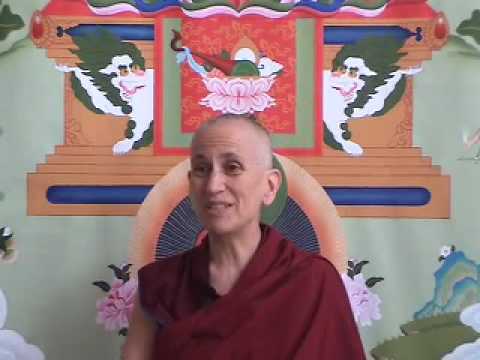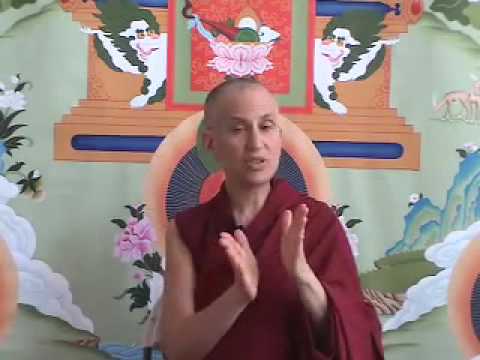Death time and our body
Stages of the Path #28: Death and impermanence, Part 6
Part of a series of Bodhisattva’s Breakfast Corner talks on the Stages of the Path (or lamrim) as described in the Guru Puja text by Panchen Lama I Lobsang Chokyi Gyaltsen.
- Activating our lives by thinking about death
- Negative karma we create in relation to our body
- Considering the amount of time we spend taking care of our body
- Cultivating a healthy relationship with our body
We’ve been talking about the meditation on death and how it’s used to help us activate our lives, and live our lives at a very vivacious way. Because when we realize that we’re mortal then it makes us look more closely at what we do in our lives and why (we do them).
We’ve been talking about at the time of death what’s important. When we die our possessions stay here, our friends and relatives stay here, our body stays here, and we go on to the next life with the karmic seeds—the seeds of the actions that we’ve done. And we create all of these karmic seeds usually in relationship to our body, and our possessions, and our friends and relatives. So the things that we create the karma in relationship to stay here–we can’t take them with us–but the karma we create in procuring and protecting them, that comes with us.
We were talking before about, with possessions and how we can create a lot of negative karma regarding possessions, and being greedy, and cheating people (in order) to get them. We talked about, with our friends and relatives, how sometimes we can create negative karma in relationship to them by lying to protect them, or speaking harshly to somebody else who criticizes our dear ones, things like that.
Today we’re going to talk about our body. I think you are well aware of how we create negative karma in relationship to our body. Somebody threatens our body, we get angry. We can kill to protect our body. We steal from other people (in order) to get comfortable things that please the body. We can lie (again) to get things that please our body. So much time spent on vanity which could be used in practicing the Dharma, but instead we’re trying to make our body comfortable, make our body beautiful, etc.. I’m sure you’re quite familiar with it.
If you spend some time, it’s quite interesting to think of how much time we spend each day taking care of this body. And we create so much karma, sometimes being greedy, sometimes being angry, sometimes being confused in relationship to the body. But at the time we die this body says “bye bye” and it stays here, and all that karma comes with us.
What this is doing is it’s putting in front of us the question about how do we have a healthy relationship with our body? Considering that at the end of the day the body is going to desert us. We need to protect the body because it’s the basis for our precious human life and our being able to practice the Dharma, but we don’t want this body to become the cause of creating negative karma, because then instead of being the basis for practicing the Dharma it’s the basis for sending us to an unfortunate rebirth.
The thing is how to cultivate a good relationship with the body, whereby we keep it healthy, we keep it clean, we keep it operating properly, but we don’t get into the thing of worry, and anxiety, and attachment, and anger, and so much fret about our body, the mind, so much always, “How do I look? Do I look good enough? What do other people think about my body?” That’s when you’re younger. Then when you’re older: “Oh, my body hurts. What’s going to happen to my body? It’s not so attractive. Who’s going to like me?” And then when you’re dying: “Oh I’ve got to separate from this body….” All it is is this pile of meat, but all of a sudden we’re so attached to it. Although if you look at anybody else’s body it’s like… Are you going to be attached to that after it dies? No, I don’t think so.
Really thinking about, “How do I relate to my body in a way so that I can use it to practice the Dharma, but I don’t get all whacked out now worrying about it, and I don’t, in reference to the body, create negative karma?”
I’m putting that as a question for you to reflect on, not as a question for me to answer. It’s our own reflections on this topic that are really important for us, because that’s what helps us to make some determinations about how we want to relate to our body.
Venerable Thubten Chodron
Venerable Chodron emphasizes the practical application of Buddha’s teachings in our daily lives and is especially skilled at explaining them in ways easily understood and practiced by Westerners. She is well known for her warm, humorous, and lucid teachings. She was ordained as a Buddhist nun in 1977 by Kyabje Ling Rinpoche in Dharamsala, India, and in 1986 she received bhikshuni (full) ordination in Taiwan. Read her full bio.


